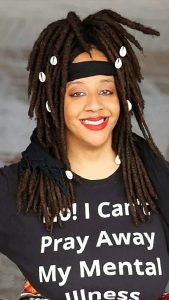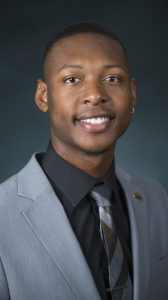
Jasmine Pierre kicks off this semester’s Breaking the Stigma event series with a talk about the stigma surrounding mental health in the African American community. The Feb. 27 event in Bryant Hall is the first in a series aiming to raise awareness of mental health care in the university’s minority communities.
Submitted photo
OXFORD, Miss. – When Dale Hall was an undergraduate student at the University of Mississippi, he had to grapple firsthand with the stigma surrounding mental health care. Now, he’s working to create a space for other students to learn about mental health and self-care without worry or embarrassment.
“I grew up not being able to talk about my mental health,” he said. “And I knew even as a child that wasn’t right.”
Hall, a student in the master’s program in higher education/student personnel and a UM graduate assistant, said it was completely foreign to him when friends who weren’t African American would talk about play therapy or counselors.
Firsthand Experience
“I didn’t know what play therapy was until this semester when I lived above a place that does play therapy,” said Hall, describing the method of therapy used to help children explore their thoughts and emotions. “For so long, I thought they were the ones who had something wrong with them, but as I grew, I understand they would be OK in the long run because it is normalized for them to seek out mental health professionals.
“We’re the ones who are packing all this stuff down and aren’t allowed to talk about it without being viewed as weak or crazy. That is what goes into stigmatizing mental health in African American communities.”
Hall said his experience is common not just in the African American community, but in many other minority communities where mental health discussions are still not mainstream.
About 30% of African American adults with mental illness receive treatment annually, compared to the 43% U.S. average ,according to the 2018 National Survey on Drug Use and Health. Hispanic-Americans receive mental health care at a similar rate, and only 22% of Asian Americans with mental illness seek care, according to a 2015 report from the American Psychiatric Association.
The same report said racial and ethnic minority youth with behavioral health issues are “more readily referred to the juvenile justice system than to specialty primary care, compared with white youth.”
A Plan to Ease into the Conversation
As a senior, Hall sought out mental health professionals, but even then it was difficult to find a professional who looked like the man he saw in the mirror. The same was true for many of his peers and friends.
That’s why Hall is launching the Breaking the Stigma event series. He has several fun and culturally relevant events planned to help students explore the connections in their physical, emotional and mental lives – all in partnership with the Division of Diversity and Community Engagement, the Center for Inclusion and Cross Cultural Engagement, the Division of Student Affairs and the University Counseling Center.
“We want to promote students talking about their emotional well-being, wellness and checking in with one another about how they are really doing, ” said Tanya Nichols, project manager for the Division of Diversity and Community Engagement and a licensed clinical psychologist. “But we want to make this campaign fun while talking about mental health and providing information about the signs of emotional distress and ways to address it.
“The more we talk about mental health, we normalize it, and show that we’re human, which breaks the stigma in the African American and broader community.”
While the series is open to all students, Hall said he specifically planned it for minority students who, like himself, didn’t feel safe or supported pursuing mental health care.
“Over the past two years, we’ve been doing a really good job of addressing mental health, which is great,” Hall said. “But when it comes specifically to the African American community, we’re still not talking as much as we need to and some issues have not been addressed as much as they should have.
“I thought about this thing where I could address mental health in a catchy way – in a way that would get us talking and ease us into the conversation instead of diving directly into it.”
The series kicks off this week with Jasmin Pierre, mental health advocate, author and creator of The Safe Place mental health app geared toward the black community, who speaks at 6 p.m. Thursday (Feb. 27) in Bryant Hall, Room 209. RSVP for the event here.
Pierre, whose book “A Fight Worth Finishing” details her battle with depression, will speak about mental health in the African American community.
“I really want people to come away from this campaign feeling like they have more tools in their toolbox in terms of being able to identify and reduce stress,” Nichols said. “They can feel like they have some healthy habits for taking care of themselves and checking in with others.”
In March, Breaking the Stigma will host a stress-relieving line dance workout and a relaxing sip-and-paint event featuring mocktails. In April, students are invited to participate in R&B yoga and trap Zumba.
Breaking the Stigma organizers also will be in front of the Student Union this semester to get students talking about their mental health.
